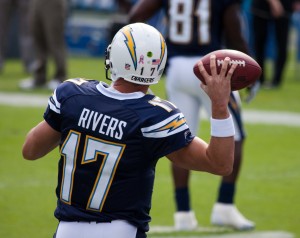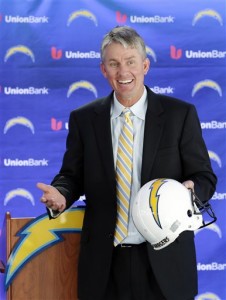AFC East and NFC East Season in review
AFC North and NFC North Season in review
AFC North and NFC South Season in review
In the case of the AFC West, a picture can say a thousand words.

Denver Broncos
Pre-season Projection: 8.5 wins
Maximum wins: 13 (after weeks 10 through 16)
Minimum wins: 9 (after weeks 3, 5 )
Week 1 comment: Watching Peyton Manning work his magic was a thing of beauty on Sunday night. The less John Fox touches this offense, the better, but I think everyone in Denver already knows that.
Once Peyton Manning proved that he was healthy and back, the AFC West race was effectively over. Officially, that happened in the week 6 comeback over the Chargers. That win only made them 3-3, but here is what I wrote then: According to Advanced NFL Stats, Denver is the best team in the league. Their remaining schedule is absurdly easy, so I’m going to perhaps prematurely give them a two-win bump. Their week 15 game in Baltimore may be for a bye, and I now think Denver is the favorite.
Kudos to Brian Burke’s model for correctly identifying how good the Broncos were early in the year. After week 9, I pegged Denver at 12 wins, and wrote: As a matter of principle, projecting a team to finish 7-1 is never advised. But this seems to be a good place to make an exception.
The next week, I bumped them to 13 wins, and never moved off that number. They got a late Christmas present from Manning’s old team, and now the AFC playoffs will have to go through Denver.
San Diego Chargers
Pre-season Projection: 9 wins
Maximum wins: 9 (after weeks 1, 2, and 4)
Minimum wins: 6 (after weeks 10 through 13, 16)
Week 1 comment: Unimpressive on Monday Night Football, but the schedule lines up for them to succeed. Philip Rivers is still elite, so expecting them to only go 8-7 the rest of the way is probably more of a knock on them than anything else. A healthy Ryan Mathews back will help.
The Chargers schedule was ridiculously easy, but they lost to the Browns, Saints, and Panthers, and couldn’t beat the Ravens, Bengals, or Bucs. The decline of Philip Rivers from elite quarterback to throw-it-out-of-bounds master is depressing, and it’s easy and probably appropriate to point the blame at the general manager. Going into 2013, San Diego will have a new head coach and GM, and we’ll see if that is what was needed to resurrect Rivers’ career.
It’s not easy to remember, but the Chargers were actually 3-1. At that point, I wrote: An unimpressive 3-1 team with a struggling offensive line. I really wanted to keep them at 8 wins, but their schedule is too easy and Philip Rivers — even in a down year — is good enough to lead them to a .500 record the rest of the way.
But by the time they were 3-4, I had already started with the “I can’t think of anything positive to say about the Chargers right now” comments. I summed up the Chargers season after week 13, when I wrote: This team started 2-0 but hasn’t beaten anyone but the Chiefs since then.
Of course, San Diego being San Diego, the Chargers did finish with 7 wins, but it was another disappointing season for the franchise. It’s hard to think back to September, but Vegas really did project the Chargers to win this division.
[continue reading…]



